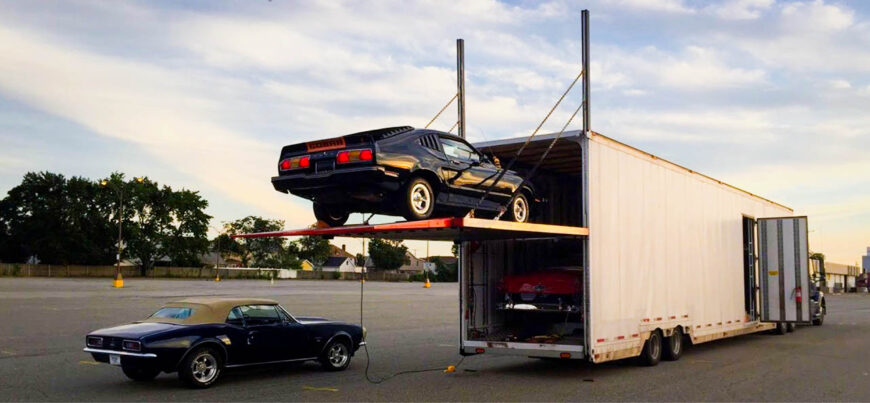Shipping your car is an important investment, so you want to be sure it’s in reliable hands. Asking questions about a potential company will give you peace of mind that your car will arrive safely and on schedule – so read the following article to get a better idea of what you should be looking for and asking about on your next visit to a shipment center.

Source: pods.com
1. What is the Cost?
When sending a vehicle, there are numerous factors that contribute to the final cost. The type and size of your vehicle, its distance to travel, as well as other decisions can all influence pricing significantly.
The most common method for sending a vehicle is by truck (https://www.moving.com/tips/car-shipping-options/) though prices will vary based on how many miles are being moved. Other options such as enclosed transport and door-to-door service will add to the expense of moving your vehicle.
When selecting a car shipping company, it is best to select one with extensive experience and transparent pricing models. Doing so will help you avoid hidden fees and guarantee you don’t overpay for your shipment.
2. What is the Time Frame?
When sending a vehicle, several things can and will impact the timeframe. These include the season, distance traveled and any unexpected issues that arise during transit.
Winter, the accumulation of ice and snow on the road can significantly lengthen transportation times, especially for shipments crossing mountain passes.
The timeframe can also be affected by how long it takes to load and unload your vehicle. If your car is oversized, loading may take more time than with a standard car.

Source: shipvehicles.com
3. What is the Loading Procedure?
Shipping your car requires that you empty its interior of any personal items and any extra parts that could get damaged during transit. Make sure any bicycle racks or luggage racks that may have been installed in your vehicle have been taken off and placed elsewhere.
It’s wise to disable your alarm during shipping in case the driver accidentally sets it off. Doing this can protect any damage in the event that your vehicle experiences mechanical issues during transit.
4. What is the Pick-up Time?
If you’re shipping your car to another state or across America, you may be wondering how long it will take. When considering cross country vehicle transport, it may be difficult to figure out when the best time is to pick up. The answer depends on several factors such as pickup and delivery locations, traffic conditions, road conditions, and other stops along the way.
On average, car shipments across America take six to twelve days. But this timeline isn’t the only factor influencing shipping time; other elements like weather conditions, construction delays and truck breakdowns must also be taken into account when planning your itinerary.

Source: foreignpolicyi.org
5. What is the Delivery Time?
Delivery time refers to the duration of time it takes an auto transport company to pick up and deliver a car from one location, depending on the shipping method used and other factors. This timeline may be shorter or longer depending on certain factors such as weather conditions.
The distance between pickup and delivery locations is a key factor that determines shipping time. The longer the journey, the longer it will take to deliver your vehicle.
Other factors that could affect shipping time include how many stops the carrier needs to make along the way and traffic congestion. These things could slow down a truck driver by several days, which will also impact delivery timing.

Source: bigrigdrivingschool.ca
6. What is the Insurance Coverage?
Vehicle shipping insurance is a must when transporting your vehicle across the country or even internationally, and you can learn about it by clicking here. Not only does it come at no additional cost (all carriers must provide basic liability coverage by law), but it can be invaluable in case of an accident or theft while in transit.
Because vehicle shipping plans are legally essential, you need to make sure to read the fine print carefully before signing anything. It should include a list of specific coverage’s offered by the company as well as how much deductible will be applied.
When shipping your car, the company you go with will have recommendations for the appropriate insurance coverage to be put in place. Doing this will guarantee that you don’t end up paying extra money out-of-pocket in case anything happen to your vehicle during transport?
In the auto transport industry, there are various types of insurance. These include customer, carrier and broker coverage that cover various aspects of transportation. Coverage will protect your car in case of damage while in transit, helping you avoid expensive repairs or total losses.
Auto transport insurance comes in many forms, each with its own advantages and drawbacks. Before signing any contract with your carrier, make sure you understand which type of policy they offer and how it functions.
It is wise to inquire about their liability and cargo insurance. Doing so will shield you from the potential of your car causing harm during transport.




